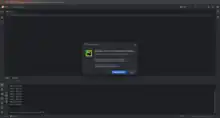PyCharm
PyCharm is an integrated development environment (IDE) used for programming in Python. It provides code analysis, a graphical debugger, an integrated unit tester, integration with version control systems, and supports web development with Django. PyCharm is developed by the Czech company JetBrains.[4]
 PyCharm 2023.2 Community Edition | |
| Developer(s) | JetBrains |
|---|---|
| Initial release | 3 February 2010 |
| Stable release | |
| Written in | Java, Python |
| Operating system | Windows, macOS, Linux |
| Size | 174–555 MB |
| Type | Python IDE |
| License |
|
| Website | www |
| Developer(s) | JetBrains |
|---|---|
| Initial release | 30 October 2014[2] |
| Stable release | 2022.3 (Build 223.7571.203)
/ 1 December 2022[3] |
| Written in | Java, Python |
| Operating system | Windows, macOS, Linux |
| Size | 320–430 MB |
| Type | IDE |
| License | Apache License 2.0 |
| Website | www |
It is cross-platform, working on Microsoft Windows, macOS and Linux. PyCharm has a Professional Edition, released under a proprietary license and a Community Edition released under the Apache License.[5] PyCharm Community Edition is less extensive than the Professional Edition.
Features
- Coding assistance and analysis, with code completion, syntax and error highlighting, linter integration, and quick fixes
- Project and code navigation: specialized project views, file structure views and quick jumping between files, classes, methods and usages
- Python code refactoring: including rename, extract method, introduce variable, introduce constant, pull up, push down and others
- Support for web frameworks: Django, web2py and Flask
- Integrated Python debugger
- Integrated unit testing, with line-by-line coverage
- Google App Engine Python development
- Version control integration: unified user interface for Mercurial, Git, Subversion, Perforce and CVS with changelists and merge
- Scientific tools integration: integrates with IPython Notebook, has an interactive Python console, and supports Anaconda as well as multiple scientific packages including Matplotlib and NumPy.[6][7]
History
PyCharm was released to the market of the Python-focused IDEs to compete with PyDev (for Eclipse) or the more broadly focused Komodo IDE by ActiveState.
The beta version of the product was released in July 2010, with the 1.0 arriving 3 months later. Version 2.0 was released on 13 December 2011, version 3.0 was released on 24 September 2013, and version 4.0 was released on November 19, 2014.[8]
PyCharm became Open Source on 22 October 2013. The Open Source variant is released under the name Community Edition – while the commercial variant, Professional Edition, contains closed-source modules.[5]
Licensing
See also
References
- "PyCharm 2023.2: New Live Templates for Django, Black Formatter Integration, Run Anything, and AI Assistant". 26 July 2023. Retrieved 6 August 2023.
- "JetBrains Debuts PyCharm Educational Edition". JetBrains Blog. 21 March 2021.
- "Get Your Educational Tool", JetBrains.
- "JetBrains Strikes Python Developers with PyCharm 1.0 IDE". eWeek. Archived from the original on January 22, 2013.
- PyCharm 3.0 community edition source code now available Jet Brains. October 2013.
- https://www.jetbrains.com/pycharm/features/
- "What is PyCharm | Where do we Use PyCharm? | Features". EDUCBA. 2021-11-04. Retrieved 2023-08-28.
- Filippov, Dmitry (November 19, 2014). "Announcing General Availability of PyCharm 4". PyCharm Blog. Retrieved 24 February 2015.
- Classroom, Jet Brains website.
- PyCharm Community Edition on GitHub.